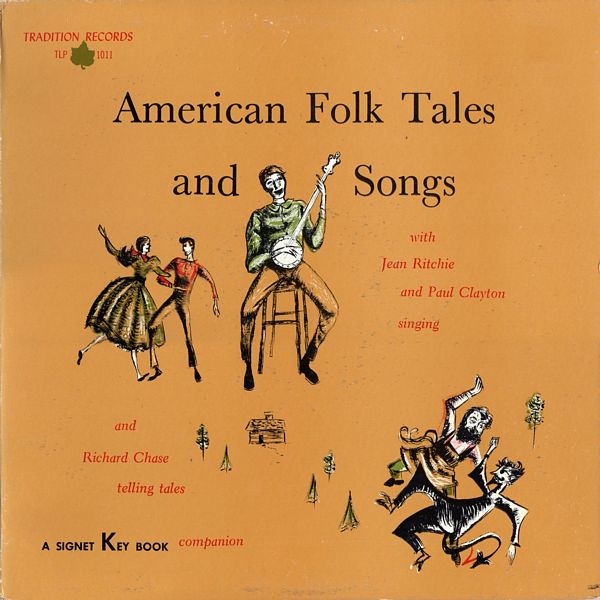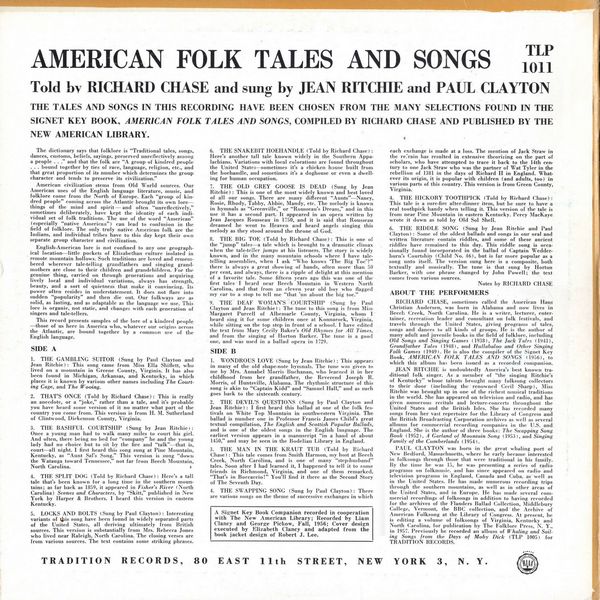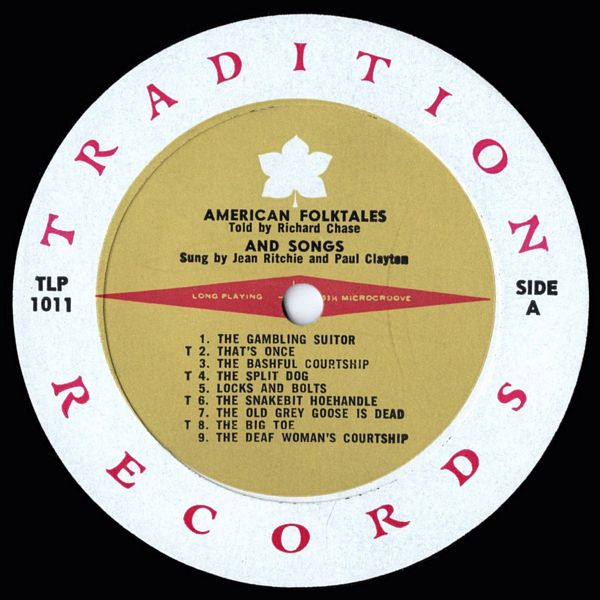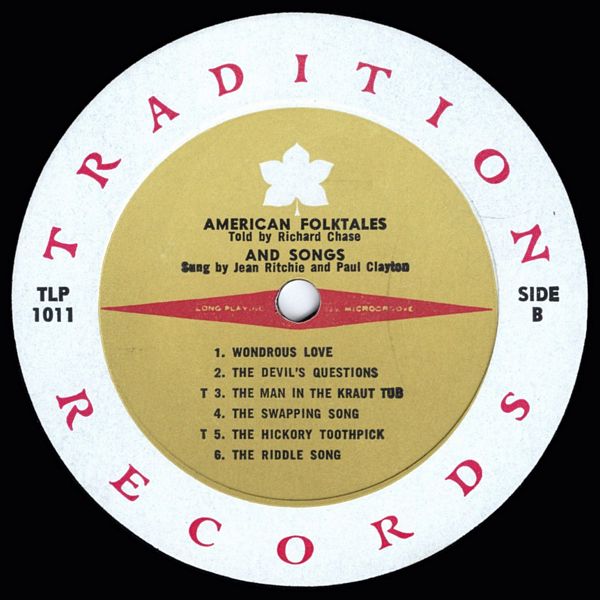

 |



|
Sleeve Notes
The dictionary says that folklore is "Traditional tales, songs, dances, customs, beliefs, sayings, preserved unreflectively among a people … " and that the folk are "A group of kindred people … bound together by ties of race, language, religion, etc., and that great proportion of its number which determines the group character and tends to preserve its civilization."
American civilization stems from Old World sources. Our American uses of the English language literature, music, and folklore come from the North of Europe. Each "group of kindred people" coming across the Atlantic brought its own lore — things of the mind and spirit — and often "unreflectively," sometimes deliberately, have kept the identity of each individual set of folk traditions. The use of the word "American" (especially "native American") can lead to confusion in the field of folklore. The only truly native American folk are the Indians, and individual tribes have to this day kept their own separate group character and civilization.
English-American lore is not confined to any one geographical location — little pockets of Elizabethan culture isolated in remote mountain hollows. Such traditions are loved and remembered wherever tale-telling grandfathers and singing grandmothers are close to their children and grandchildren. For the genuine thing, carried on through generations and acquiring lively local and individual variations, always has strength, beauty, and a sort of quietness that make it convincing. Its power often resides in understatement. It does not flare into sudden "popularity" and then die out. Our folkways are as solid, as lasting, and as adaptable as the language we use. This lore is organic, not static, and changes with each generation of singers and tale-tellers.
This record presents samples of the lore of a kindred people — those of us here in America who, whatever our origins across the Atlantic, are bound together by a common use of the English language.
THE GAMBLING SUITOR (Sung by Paul Clayton and Jean Ritchie)
This song came from Miss Ella Shiflett, who lived on a mountain in Greene County, Virginia. It has also been found in Michigan, Arkansas, and Kentucky, in which places it is known by various other names including The Courting Cage, and The Wooing.
THAT'S ONCE (Told by Richard Chase)
This is really an anecdote, or a "joke," rather than a tale, and it's probable you have heard some version of it no matter what part of the country you come from. This version is from H. M. Sutherland of Clintwood, Dickenson County, Virginia.
THE BASHFUL COURTSHIP (Sung by Jean Ritchie)
Once a young man had to walk many miles to court his girl. And often, there being no bed for "company" he and the young lady had no choice but to sit by the fire and "talk" — that is, court — all night. I first heard this song sung at Pine Mountain, Kentucky, as "Aunt Sal's Song." This version is sung "down the Watauga toward Tennessee," not far from Beech Mountain, North Carolina.
THE SPLIT DOG (Told by Richard Chase)
Here's a tall tale that's been known for a long time in the southern mountains; as far back as 1859, it appeared in Fisher's River (North Carolina) Scenes and Characters, by "Skitt," published in New York by Harper & Brothers. I heard this version in eastern Kentucky.
LOCKS AND BOLTS (Sung by Paul Clayton)
Interesting variants of this song have been found in widely separated parts of the United States, all deriving ultimately from British sources. This version is substantially from Mrs. Rebecca Jones who lived near Raleigh, North Carolina. The closing verses are from various sources. The text contains some striking phrases.
THE SNAKEBIT HOEHANDLE (Told by Richard Chase)
Here's another tall tale known widely in the Southern Appalachians, Variations with local colorations are found throughout the United States — sometimes it's a chicken house built from the hoehandle. and sometimes it's a doghouse or even a dwelling for human occupation.
THE OLD GREY GOOSE IS DEAD (Sung by Jean Ritchie)
This is one of the most widely known and best loved of all our songs. There are many different "Aunts" — Nancy, Rosie. Rhody, Tabby, Abbie, Mandy, etc. The melody is known in hymnals as "Greenville," or "Rousseau's Dream," and in this use it has a second part. It appeared in an opera written by Jean Jacques Rousseau in 1750, and it is said that Rousseau dreamed he went to Heaven and heard angels singing this dy as thev stood around the throne of God.
THE BIG TOE (Told by Richard Chase)
This is one of the "jump" tales — a tale which is brought to a dramatic climax when the tale-teller jumps at his listeners. The story is widely taami and in the many mountain schools where I have tale-telling assemblies, when I ask "Who knows 'The Big Toe'?" there is always a great showing of hands, often more than 50 per cent, and always, there is a ripple of delight at this mention of a favorite tale. Some fifteen years ago this was one of the first tales I heard near Beech Mountain in Western North Carolina, and that from an eleven year old boy who flagged my ear to a stop to tell me "that 'un about the big toe."
THE DEAF WOMAN'S COURTSHIP (Sung by Paul Clayton and Jean Ritchie)
The tune to this song is from Miss Margaret Purcell of Albemarle County, Virginia, whom I heard sing it for some children once at Konnarock, Virginia, while sitting on the top step in front of a school. I have edited the text from Mary Cecily Baker's Old Rhymes for All Times, and from the singing of Horton Barker. The tune is a good and was used in a ballad opera in 1729.
WONDROUS LOVE (Sung by Jean Ritchie)
This appears in many of the old shape-note hymnals. The tune was given to me by Mrs. Annabel Morris Buchanan, who learned it in her childhood from her grandfather, the Reverend Joseph R. Morris, of Huntsville, Alabama. The rhythmic structure of this song is akin to "Captain Kidd" and "Samuel Hall," and as such fees back to the sixteenth century.
THE DEVIL'S QUESTIONS (Sung by Paul Clayton and Jean Ritchie)
I first heard this ballad at one of the folk festivals on White Top Mountain in southwestern Virginia. The ballad is number one in Professor Francis James Child's great textual compilation, The English and Scottish Popular Ballads, and is one of the oldest songs in the English language. The earliest version appears in a manuscript "in a hand of about 1450." and may be seen in the Bodelian Library in England.
THE MAN IN THE KRAUT TUB (Told by Richard Chase)
This tale comes from Smith Harmon, my host at Beech Creek, North Carolina, and is one of many "step-husband" tales. Soon after I had learned it, I happened to tell it to some friends in Richmond, Virginia, and one of them remarked, "That's in Boccaccio!" You'll find it there as the Second Story of The Seventh Day.
THE SWAPPING SONG (Sung by Paul Clayton)
There are various songs on the theme of successive exchanges in which
each exchange is made at a loss. The mention of Jack Straw in the re.'rain has resulted in extensive theorizing on the part of scholars, who have attempted to trace it back to the 14th century to one Jack Straw who was the partner of Wat Tyler in the rebellion of 1381 in the days of Richard II in England. Whatever its origin, it is popular with children (and adults, too) in various parts of this country. This version is from Green County, Virginia.
THE HICKORY TOOTHPICK (Told by Richard Chase)
This tale is a sure-fire after-dinner item, but be sure to have a real toothpick handy when telling it. This version of the tale is from near Pine Mountain in eastern Kentucky. Percy MacKaye wrote it down as told by Old Sol Shell.
THE RIDDLE SONG (Sung by Jean Ritchie and Paul Clayton)
Some of the oldest ballads and songs in our oral and written literature contain riddles, and some of these ancient riddles have remained to this day. This riddle song is occasionally found incorporated in the ballad of Captain Wedderburn's Courtship (Child No. 46), but is far more popular as a song unto itself. The version sung here is a composite, both textually and musically. The tune is that sung by Horton Barker, with one phrase changed by John Powell; the text comes from various sources.
Notes by RICHARD CHASE
ABOUT THE PERFORMERS
RICHARD CHASE, sometimes called the American Hans Christian Andersen, was born in Alabama and now lives in Beech Creek, North Carolina. He is a writer, lecturer, entertainer, recreation leader and consultant on folk festivals, and travels through the United States, giving programs of tales, songs and dances to all kinds of groups. He is the author of many adult and juvenile books in the field of folklore, including Old Songs and Singing Games (1938), The Jack Tales (1943), Grandfather Tales (1948), and Hullabaloo and Other Singing Folk Games (1949). He is also the compiler of the Signet Key Book, AMERICAN FOLK TALES AND SONGS (1956), to which this album has been issued as a recorded companion.
JEAN RITCHIE is undoubtedly America's best known traditional folk singer. As a member of "the singing Ritchie's of Kentucky" whose talents brought many folksong collectors to their door (including the renowned Cecil Sharp), Miss Ritchie was brought up in one of the richest musical traditions in the world. She has appeared on television and radio, and has given numerous recitals and lecture-concerts throughout the United States and the British Isles. She has recorded many songs from her vast repertoire for the Library of Congress and the British Broadcasting Corporation archives as well as several albums for commercial recording companies in the U.S. and England. She is the author of three books: The Swapping Song Book (1952), A Garland of Mountain Song (1953), and Singing Family of the Cumberlands (1954).
PAUL CLAYTON was born in the great whaling port of New Bedford, Massachusetts, where he early became interested in folksongs through those that were traditional in his family. By the time he was 15, he was presenting a series of radio programs on folkmusic. and has since appeared on radio and television programs in England, Canada and Cuba, as well as in the United States. He has made numerous recording trips through the southern mountains, as well as in other areas of the United States, and in Europe. He has made several commercial recordings of folksongs in addition to having recorded for the archives of the Flanders Ballad Collection, Middlebury College, Vermont, the BBC collection, and the Archive of American Folksong at the Library of Congress. At present, he is editing a volume of folksongs of Virginia, Kentucky and North Carolina, for publication by The Folklore Press, N. Y.. in 1957. Previously he recorded an album of Whaling and Sailing Songs from the Days of Moby Dick (TLP 1005) for TRADITION RECORDS.